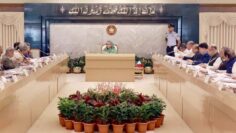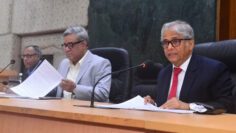18 Bangladeshi migrants return from Lebanon
Prior to their departure, the migrants underwent a mandatory health check-up, including a RT-PCR test, in Lebanon. They were offered pre-departure transportation assistance and counselling services, and also screened for underlying protection vulnerabilities by IOM in Lebanon.
The Bangladeshi migrants were also provided with post-arrival reception assistance in this country and will also receive reintegration support.
This movement is part of a coordinated effort from the Bali Process, through its Voluntary Returns Support and Reintegration Assistance Program, and IOM’s Cooperation on Migration and Partnerships for Sustainable Solutions (COMPASS) initiative funded by the Ministry of Foreign Affairs of the Netherlands, to support and protect stranded migrants, particularly against human trafficking and smuggling.
A recent IOM survey of more than 1,000 migrants in Lebanon showed that nearly half of them wanted to return home, said IOM.
With the economy in deep crisis and a political stalemate after the government resigned following the devastating Beirut Port explosion a year ago, embassies have also seen a sharp rise in the number of migrants asking to return to their countries of origin.
The results of the IOM survey showed that many migrants have lost their jobs and livelihoods due to the impact of concurrent crises in Lebanon, and an increase in exploitative practices such as non-payment of wages, unfair dismissal, or breach of contracts by employers, have subjected migrants to greater hardship.
“Living in Lebanon has been extremely difficult as we are not able to meet basic needs, nor support our families back home,” said one of the returnees. “Migrants in Lebanon need support to survive and return to their country of origin. I am grateful to IOM for arranging my return to Bangladesh.”
“Many migrants are reaching out to IOM for help. They have lost their jobs. They are hungry, they cannot access medical care, and feel unsafe. Many are so desperate that they want to leave the country, but they do not have the means to do so,” said Mathieu Luciano, Head of IOM in Lebanon.



















